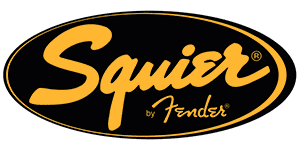
Приобретенный компанией Fender в 1965 году, бренд был официальным поставщиком струн для уникальных новых электрических гитар Fender - Squier был одним из самых успешных производителей реплик самых известных гитар Fender. Учитывая хорошее качество и разумную стоимость, продукция Squier всегда имела высокий спрос.
Джером Бонапарт "J.B." Скуайер был английским иммигрантом в США. Когда он приехал в Мичиган в 19 веке, он уже владел мастреством изготовления скрипки. Вместе со своим сыном они производили скрипки с исключительным покрытием, а в 1890 году Виктор Сквайр открыл свой собственный магазин, в результате чего США познакомились по-лучше с традиционно европейским ремеслом. Его скрипка, банджо и гитарные струны стали известными по всей стране и были особенно популярны среди студентов из-за их привлекательной цены. Squier начал выпускать струны для электрических инструментов в 1930-х годах.
С 1950-х годов история Squier тесно связана с взлетами и падениями Fender. После 1970-х годов, когда Fender был куплен CBS, множество копий Fender было сделано японскими производителями, реплики которых больше походили на пародию. Вот почему в 1982 году Fender организовал собственное производство в Японии, чтобы сохранить честь и достоинство продукции великого бренда. Самое забавное, что многие из «подражателей» были наняты Fender на работу в новых фабричных помещениях. Чтобы избавить Европу от прежних копий Fender, «сделанных в Азии», бренд решил найти целевого партнера, который будет экспортировать новые модели. Squier наконец-то возродился, и на рынке появилась серия винтажных моделей Fender Japan. Музыкальная индустрия стала свидетелем появления инструментов Squier JV («Японский винтаж»). Качество было отличным, и были внесены некоторые изменения, например такие, как блок из цинкового тремоло вместо стального.
В конце 1983 года, тогда как в Европе и Японии компания уже заняла определенную нишу, Fender решил импортировать инструменты Squier в Соединенные Штаты, чтобы конкурировать с многочисленными копиями, наводнившими внутренний рынок. Чтобы заставить их выделиться, не крича о конкуренции, Fender принял интересное решение: модели Squier получили функции, типичные для 70-х, и были заявлены как первые инструменты, «официально разрешенные» последователей классических проектов Fender.
Оригинальные винтажные модели стали основой Squier Standard Series, представленной в середине 1980-х годов, с некоторыми различиями в оптимизации и современным дизайном. Серия Standard продолжала выпускаться в начале 1990-х годов и стала новым поколением моделей Squier.
Гитары и бас гитары серии Affinity и Pro Tone/Vista появились в 1996 году. Такие тонкие штрихи, как прозрачная отделка на корпусах из ясеня и золотые детали, превратили Squier в нечто большее, чем качественный лоу-кост продукт от Fender. Новая эра началась для Squier. Модели Vista, такие как Super-Sonic, Venus и Venus XII, были новаторскими проектами без четких предшественников Fender; другие комбинировали функции Fender разных моделей, становясь некими модифицированными существами, такими как Jagmaster, который по-прежнему остается уважаемым инструментом Squier сегодня.
Серия Affinity отвечала за большие продажи - новички предпочитали покупать Squier, потому что бренд заботился о том, чтобы упаковывать в свои инструменты все, что им нужно, чтобы войти в мир профессиональной музыки.
В начале 2000-х Squier выпустил короткоживущую серию Showmaster и продолжил выпуск своих коммерческих серий Affinity и Standard, внося некоторые изменения.
Немного позже появились инструменты серии 24, разного стилевого направления, предлагаемого Squier, и оказались рыночным провалом. Ввиду отсутствия коммерческого успеха Squier выпустил модель Tom DeLonge Stratocaster, которая стала бестселлером - модель напоминает дизайном Stratocaster 70-х годов и представляет собой сборку с истинным подходом Fender.
В середине 2000-х Squier запустил несколько специальных проектов и ограниченные выпуски, а в 2005 году бренд представил Master Series. Инженеры Fender Custom Shop разработали две модели Master Series - M-80 и Esprit.
В 2007 году Squier представил серию Vintage Modified; винтажные варианты моделей Stratocaster и Telecaster.
Squier – это Fender. Так они говорят о себе. Мы же говорим, что Squier - это достойная страница в истории Fender. Волшебная палочка, которая так много раз спасала репутацию мирового бренда.

